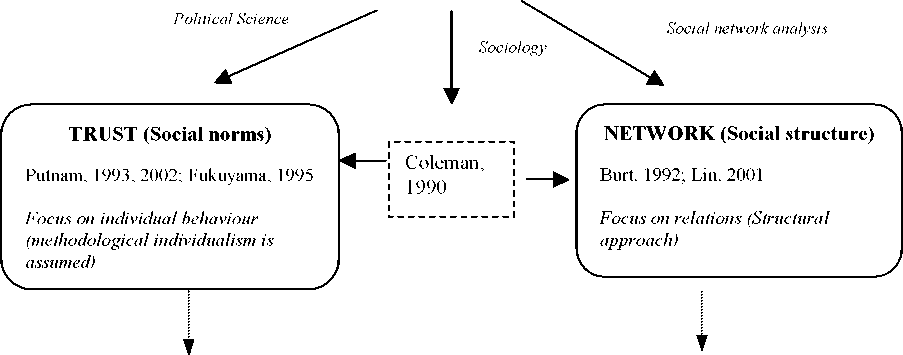Valeria Sodano and Fabio Verneau 199
Social capital
DEFINITION

Theories of reciprocity
(Bowles, 2004; Fher et al, 200,2001)
Game theory, Antropology, Behavioural
economics
Economic socology
(Smelser-Swedberg, 2005)
Figure 1. Two social capital perspectives
over the last fifteen years, economic theories have borrowed the concept of social capital from
sociology and politics, mainly through the bridges built by economic sociology. Institutional
theories have looked at the trust perspective when studying trust and social norms as exchange
organizational forms alternative to markets, contracts and hierarchies. Management and
industrial organization theories have looked whether at trust, as a lubricant of inter and intra
firm relationships, or at network perspective, considering social capital as a source of
competitive advantage.
With respect to the food system, the concept of social capital has been mainly used in order to
explain at least three strategic and organizational features of the system:
1. The “maintenance” of regional products, as niche markets surviving in the
monopolistically competitive fringes of the huge oligopolies leading the system. In that case
social capital is involved in the process of construction and enforcement of quality standards
used in the definition of origin denomination, and in the process of quality perception (this
latter being associated, for these products, with cultural-based credence quality attributes).
2. The success and consolidation of local agro-industrial district. Industrial districts are a
special type of inter-organizational form characterized by the presence of a small-firm
network with specific territorial boundaries In industrial districts social norms are as
important as formal institutions in coordinating actors’ behaviour The literature on industrial
districts (Pyke and Sengerberger, 1992; Brusco, 1996; Sodano, 2004) has generally
maintained that at the core of the organizational specificity of a district there is the
exploitation of some form of social capital embedded in social relations.
More intriguing information
1. The name is absent2. Corporate Taxation and Multinational Activity
3. The name is absent
4. Structural Conservation Practices in U.S. Corn Production: Evidence on Environmental Stewardship by Program Participants and Non-Participants
5. The name is absent
6. Analyzing the Agricultural Trade Impacts of the Canada-Chile Free Trade Agreement
7. The name is absent
8. Measuring and Testing Advertising-Induced Rotation in the Demand Curve
9. EU Preferential Partners in Search of New Policy Strategies for Agriculture: The Case of Citrus Sector in Trinidad and Tobago
10. The Advantage of Cooperatives under Asymmetric Cost Information